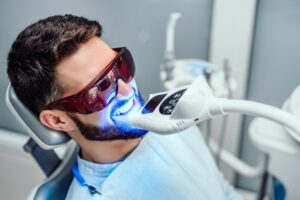
Everyone wants a bright, white smile, but before you reach for a whitening kit or schedule a professional treatment, it’s important to make sure your teeth are healthy. While teeth whitening can be safe and effective, doing it when you have untreated cavities can actually cause more harm than good. Whitening and decay don’t mix well, and combining the two can lead to pain, sensitivity, and even further damage. Here’s why cavities and teeth whitening are a dangerous combination and what you should do instead.
Whitening Products Can Irritate Tooth Decay
Whitening gels and strips contain bleaching agents—usually hydrogen peroxide or carbamide peroxide—that penetrate your enamel to lift stains. When you have cavities, that enamel is already weakened or broken down, exposing the inner layers of your tooth.
Applying a whitening product on a tooth with decay allows the bleaching agent to seep into those damaged areas. This can cause sharp pain, irritation, or chemical burns in the tooth’s nerve or pulp. Instead of achieving a whiter smile, you could end up with increased discomfort and even the need for more extensive dental treatment.
Whitening Doesn’t Work on Decayed or Damaged Teeth
Whitening is designed to remove stains from healthy enamel—not fix discoloration caused by decay or structural damage. If your teeth are discolored because of cavities, whitening products won’t make much difference. In fact, they may make your teeth look unevenly colored, with decayed areas standing out even more.
To restore both health and appearance, your dentist will first need to treat the cavities—often with fillings, crowns, or bonding—before safely brightening your smile.
Whitening Can Worsen Tooth Sensitivity
Tooth sensitivity is a common side effect of whitening, even on healthy teeth. When you have cavities, that sensitivity becomes much worse. Cavities expose the inner dentin layer of your teeth, which contains tiny nerve pathways. When a bleaching agent reaches that layer, it can cause intense pain or lingering sensitivity that makes eating, drinking, and brushing uncomfortable.
If your teeth already feel sensitive or achy, that’s a red flag to avoid whitening until your dentist evaluates your oral health.
You Risk Spreading or Worsening Decay
Cavities are bacterial infections of your tooth structure. If you use whitening products before treating them, you can irritate the surrounding gums and enamel, making it easier for bacteria to spread. The bleaching solution can also weaken already fragile enamel, allowing decay to progress faster.
This means that instead of a brighter smile, you could end up with more cavities and more expensive dental work in the future.
Professional Evaluation Protects Your Smile
The safest way to whiten your teeth is under the supervision of your dentist. Before starting any whitening treatment, your dentist will perform a full exam to check for cavities, gum disease, and enamel erosion. Treating those issues first ensures your teeth are strong enough to handle whitening safely and effectively.
If you’re cleared for whitening, your dentist can recommend the best option for your needs—whether that’s in-office whitening, take-home trays, or other cosmetic solutions.
A beautiful smile isn’t just about color—it’s about health. Whitening your teeth when you have cavities can lead to pain, sensitivity, and further damage. By treating decay first and ensuring your teeth are healthy, you’ll not only protect your smile but also achieve brighter, longer-lasting results safely.
About the Author
Dr. Anthony Dillard has more than 10 years of experience practicing dentistry! He earned his dental doctorate at the Baylor College of Dentistry in Dallas after undergraduate studies at the University of Texas and the University of North Texas. Since graduating, Dr. Dillard has pursued hundreds of hours of advanced training in areas ranging from Invisalign to BOTOX to airway health solutions. If you’re looking for a glow-up for your smile with teeth whitening, schedule an appointment with us online or call our Carrollton office at (972) 394-1492.
